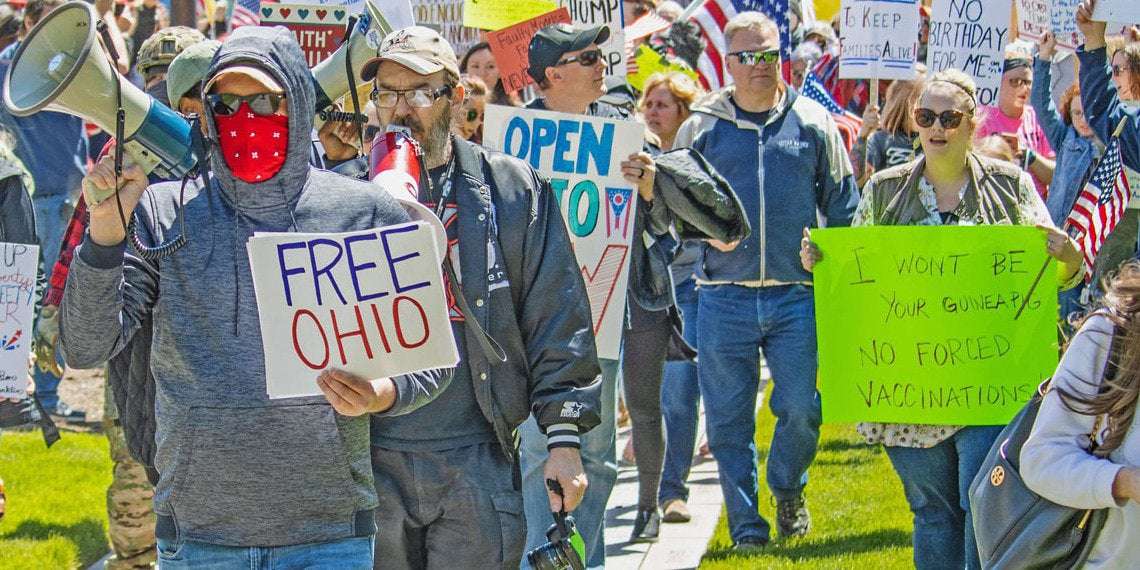New findings suggest that the contemporary anti-vaccine movement — also known as the anti-vaxx movement — is characterized by religious exclusivism. The study found that Christian nationalism was the second best predictor of anti-vaccine attitudes among Americans. The findings were published in Socius: Sociological Research for a Dynamic World.
In the United States, one of the most steady predictors of vaccine attitudes is race, with the Black population being far more skeptical toward vaccines compared to the white population. But study authors Andrew L. Whitehead and Samuel L. Perry say that the influence of race may be trailing off when it comes to the modern-day anti-vaccine movement. Conservatism, libertarianism, and anti-science attitudes characterize the movement, and the researchers propose that at the heart of these beliefs is one prevailing ideology — Christian nationalism.
Whitehead and Perry say that the endorsement of Christian nationalist ideology is not exclusive to those who practice religion and is being adopted by people who oppose both scientists’ and the mainstream media’s representations of health and disease. The current coronavirus pandemic is marked by a virus that depends on the high uptake of vaccinations to achieve herd immunity. Within this context, the researchers note that exploring the predictors of anti-vaccine ideology is crucial.
The researchers analyzed survey data from 1,219 respondents of the 2019 wave of the Chapman University Survey of American Fears (CSAF). The CSAF is a national survey that addresses a range of fears and concerns among the American public and measures seven different beliefs about vaccinations. The vaccine-related items included, “Kids today are given too many vaccines” and “The benefits of vaccines are greater than the risks”. The survey also included measures of Christian nationalism.
An analysis of the data revealed that Christian nationalism, conservatism, being older, and being Black or Hispanic (compared to white) were each associated with anti-vaccine attitudes. In contrast, greater income, higher education, and identifying as a Democrat (versus a Republican) were associated with greater support for vaccines.
Among all predictors of vaccine distrust, the strongest was race, with Black Americans showing a greater opposition to vaccines compared to white Americans. The researchers say this is unsurprising, given the history of medical abuse endured by the Black community and persisting today. While this finding was expected, the authors note that it is nevertheless important as it highlights the continuing influence of race when it comes to attitudes toward vaccines.
The second strongest predictor was Christian nationalism — even after controlling for a host of sociodemographic, religious, and political characteristics. Whitehead and Perry say this falls in line with previous findings showing that Christian nationalists are more likely to reject science, feeling that it threatens traditionalism and moral order. They are also more likely to hold libertarian populist attitudes that involve a distrust of the mainstream media’s coverage of infectious diseases. Finally, Christian nationalism has been affiliated with Donald Trump, who not only fiercely defends the influence of Christianity but has shared anti-vaxx rhetoric to millions on Twitter.
Given that the study’s data was collected before the coronavirus pandemic, it did not include a measure of support for a COVID-19 vaccine. Still, the authors caution their findings point to the potential difficulty in achieving widespread vaccination. A previous 2020 study led by Perry found evidence that Christian nationalism was linked to a reluctance to follow COVID-19 public health measures, and the authors speculate this trend likely extends to anti-vaccine attitudes.
“As we demonstrate, Americans who embrace Christian nationalism are much more likely to question the efficacy and safety of vaccines, to believe that doctors and drug companies are dishonest about vaccine risks, and to believe that it should be up to individuals to choose whether to vaccinate or not,” Whitehead and Perry report. “The implications of these findings are clear: even with the existence of a COVID-19 vaccine in the future, a substantial subset of Americans will likely view it with suspicion and resist receiving it.”
The study, “How Culture Wars Delay Herd Immunity: Christian Nationalism and Anti-vaccine Attitudes”, was authored by Andrew L. Whitehead and Samuel L. Perry.

throwaway4t4 on March 9th, 2021 at 14:36 UTC »
Combining Reddit’s two biggest circlejerks with a sociological “study” no one can reproduce that itself concluded even being a “Christian nationalist” (which is not defined anywhere in the article) is less predictive of anti-vaccine beliefs than being African American.
baevar on March 9th, 2021 at 13:34 UTC »
I love to bash the conservative Trump supporters but the data has always shown that anti-Vaxxers are a bipartisan issue. As this first article (successfully) argues, the more political one is in general, whether left or right, is a correlated factor with anti-vaccine beliefs. This would’ve had to change within the last 5 years for it to be true. Though I do seem to remember a certain orange douchebag badmouthing science the last 4 years, so if attitudes have really shifted that hard, the turd was more harmful than even I thought. I know one study found him to be the number one source of COVID misinformation in the world.
Source 1
Source 2
Safebox on March 9th, 2021 at 12:45 UTC »
In the US perhaps, but quite a few anti-vaccers in the UK aren't as religious and the leading bullshitter in London is a huge conspiratorial nut in general.